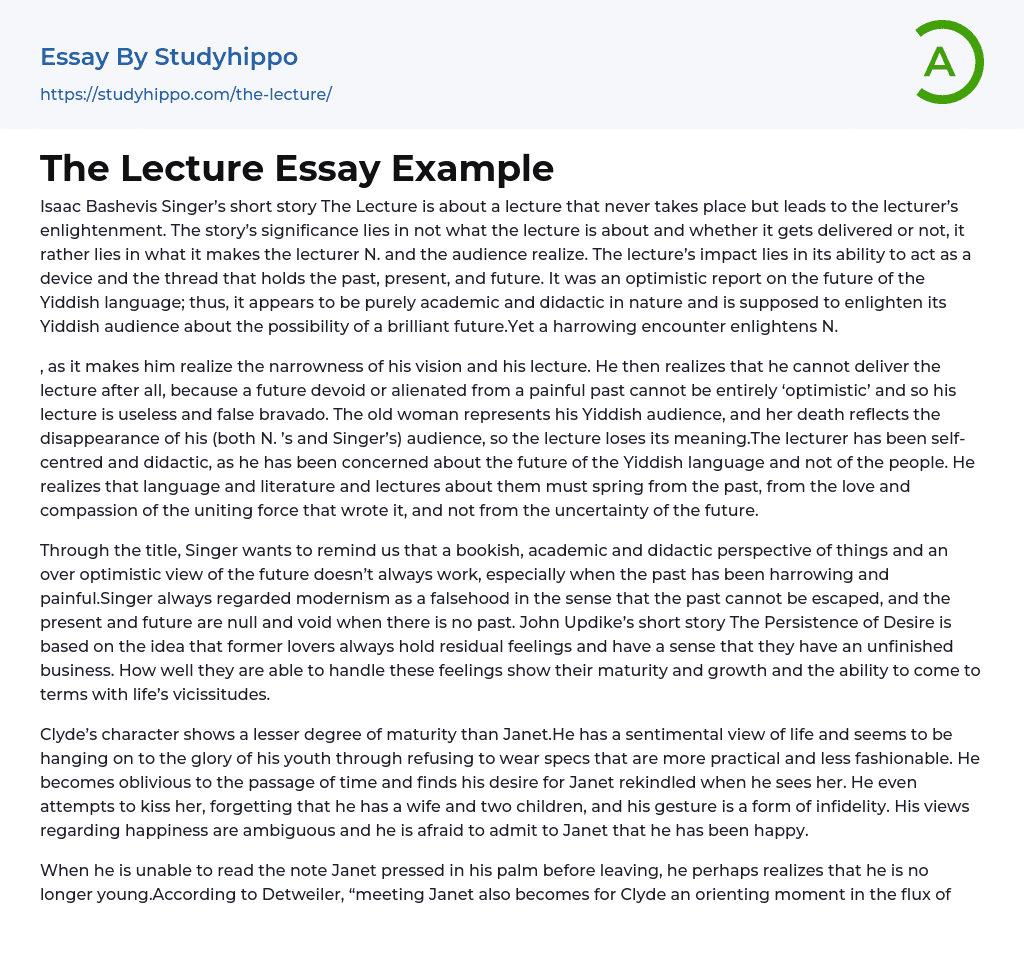Isaac Bashevis Singer's The Lecture short story is focused on the lecturer's enlightenment, even though the lecture itself doesn't happen. Its importance lies in revealing the realizations it brings about for the lecturer, N. and the audience, instead of its academic content or delivery. By acting as a device connecting past, present, and future, it becomes significant. Even though it was supposed to be an optimistic and didactic report on the Yiddish language's future to its audience, a traumatic experience leads N to an unexpected epiphany.
The lecture's narrowness of vision and lack of consideration for the people it concerns become apparent to the lecturer when he meets an old woman. He realizes that an optimistic future cannot exist in a world where a painful past has been forgotten or ignored. Therefore, he understands that his lecture is meaningles
...s and insincere. The old woman represents the disappearing Yiddish audience, making the lecture even more meaningless. The lecturer acknowledges his self-centered and didactic approach, focusing solely on the future of the Yiddish language rather than the people who speak it. He now understands that language, literature, and lectures should arise from the love and compassion of the uniting force of the past rather than the uncertainty of the future.
Singer's title serves as a reminder that a solely bookish, academic, and optimistic view of the future is not always effective when confronted with a harrowing past. Singer has always dismissed modernism as deceptive, arguing that the past cannot be disregarded and that the present and future hold little value in its absence. John Updike's The Persistence of Desire follows the notion that former romantic partner
always retain remnants of love and a sense of unresolved conflict. The ability to manage these sentiments reflects one's maturity, growth, and capacity to deal with the unpredictability of life.
Clyde possesses a less mature character in comparison to Janet. He holds a sentimental perspective towards life, clinging onto the glory of his youth by rejecting more practical and less fashionable eyeglasses. He loses track of time and experiences revived feelings of desire for Janet upon sighting her, leading him to even attempt to kiss her, disregarding his wife and children and committing an act of infidelity. His stance on happiness is uncertain, and he is fearful of confessing his contentment to Janet.
Detweiler (48) suggests that Clyde's encounter with Janet serves as an orienting moment in the flux of life, as he struggles to read the note she left in his hand, indicating his loss of youth. The short stories illustrate how the characters reconcile with their past, present, and future in unique ways. Through N.'s experience in Montreal, he becomes cognizant of human suffering, pain, tribulations, and the burden of the past, while learning about the potency of compassion and hope for a promising future.
On the other hand, Clyde discovers that a previous romantic relationship brings up a sense of familiarity and beauty, but it remains a part of his past.
- Torah essays
- Age Of Enlightenment essays
- Ethos essays
- Time essays
- Acceptance essays
- Meaning Of Life essays
- Reality essays
- Natural Law essays
- Political Philosophy essays
- Utilitarianism essays
- Existence essays
- Free Will essays
- Good And Evil essays
- Confucianism essays
- Relativism essays
- Conscience essays
- Environmentalism essays
- Empiricism essays
- Epistemology essays
- Ethics essays
- Existentialism essays
- Human Nature essays
- Individualism essays
- Metaphysics essays
- Philosophy Of Life essays
- Transcendentalism essays
- Truth essays
- Destiny essays
- Determinism essays
- Fate essays
- Functionalism essays
- Philosophers essays
- Pragmatism essays
- Future essays
- Child Observation essays
- Critical Reflection essays
- Teaching Philosophy essays
- Personal Philosophy essays
- Action Speak Louder Than Words essays
- Can Money Buy Happiness essays
- Values of Life essays
- Ethical dilemma essays
- Normative Ethics essays
- Virtue Ethics essays
- Belief essays
- Deontology essays
- Moral essays
- Virtue essays
- Work Ethic essays
- Henry David Thoreau essays




